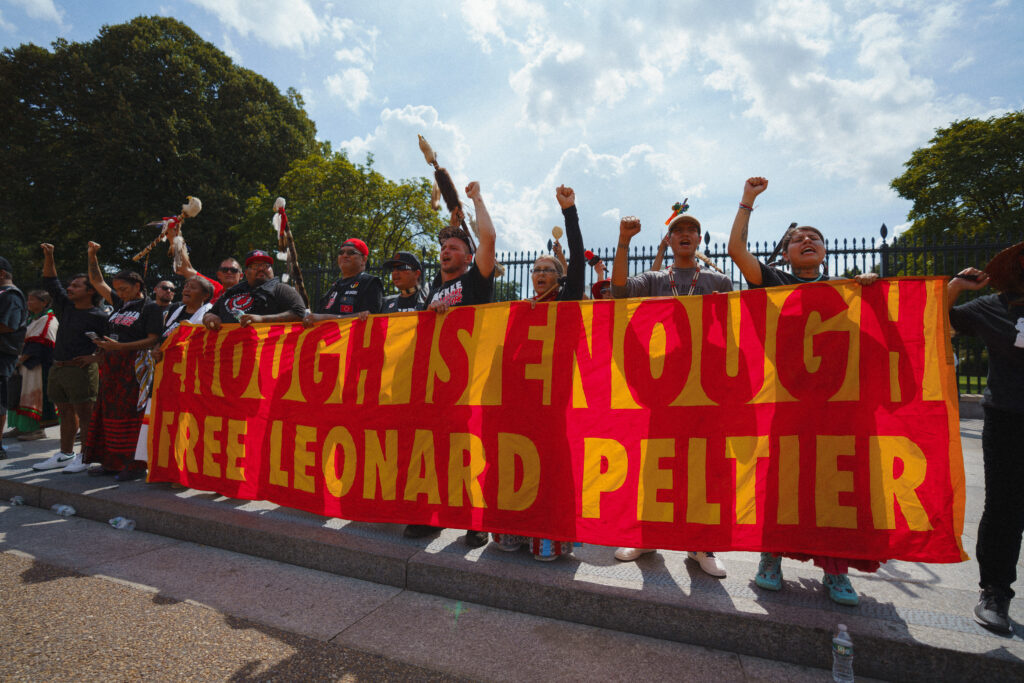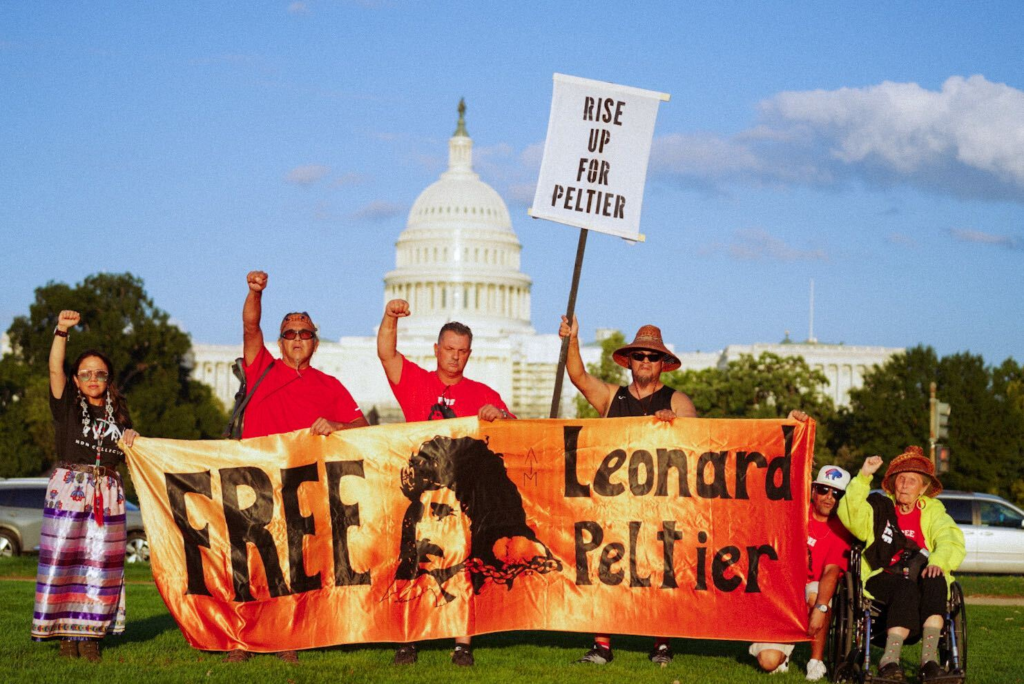Trump’s financial backer Musk is factoring in the loss of entire sectors of the government to the economy under Trump

Elon Musk speaks to Donald Trump supporters during a Republican campaign rally at Madison Square Garden in New York. (CC Image via Flickr)
On Friday, October 25, at a town hall held on his social media platform X, Elon Musk told the audience that if Trump wins, he expects to work in a Cabinet-level position to cut the federal government.
He told people to expect “temporary hardship” but that cuts would “ensure long-term prosperity.” At the Trump rally at New York City’s Madison Square Garden on Sunday, Musk said he plans to cut $2 trillion from the government. Economists point out that current discretionary spending in the budget is $1.7 trillion, meaning his promise would eliminate virtually all discretionary spending, which includes transportation, education, housing, and environmental programs.
Economists agree that Trump’s plans to place a high tariff wall around the U.S., replacing income taxes on high earners with tariffs paid for by middle-class Americans, and to deport as many as 20 million immigrants would crash the booming economy. Now Trump’s financial backer Musk is factoring in the loss of entire sectors of the government to the economy under Trump.
Trump has promised to appoint Musk to be the government’s “chief efficiency officer.” “Everyone’s going to have to take a haircut.… We can’t be a wastrel.… We need to live honestly,” Musk said on Friday. Rob Wile and Lora Kolodny of CNBC point out that Musk’s SpaceX aerospace venture has received $19 billion from the U.S. government since 2008.
An X user wrote: “I]f Trump succeeds in forcing through mass deportations, combined with Elon hacking away at the government, firing people and reducing the deficit—there will be an initial severe overreaction in the economy…. Markets will tumble. But when the storm passes and everyone realizes we are on sounder footing, there will be a rapid recovery to a healthier, sustainable economy. History could be made in the coming two years.”
Musk commented: “Sounds about right[.]”
This exchange echoes the prescription of Treasury Secretary Andrew Mellon, whose theories had done much to create the Great Crash of 1929, for restoring a healthy economy. “Liquidate labor, liquidate stocks, liquidate the farmers, liquidate real estate,” he told President Herbert Hoover. “It will purge the rottenness out of the system. High costs of living and high living
will come down. People will work harder, live a more moral life. Values will be adjusted, and enterprising people will pick up the wrecks from less competent people.”
Mellon, at least, was reacting to an economic crisis thrust upon an administration. Musk is seeking to create one.
Today the Commerce Department reported that from July through September, the nation’s economy grew at a solid 2.8%. Consumer spending is up, as is investment in business. The country added 254,000 jobs in September, and inflation has fallen back almost to the Federal Reserve’s target of 2%.
It is extraordinarily rare for a country to be able to reduce inflation without creating a recession, but the Biden administration has managed to do so, producing what economists call a “soft landing,” rather like catching an egg on a plate. As Bryan Mena of CNN wrote today: “The US economy seems to have pulled off a remarkable and historic achievement.”
Both President Joe Biden and Democratic presidential nominee Vice President Kamala Harris have called for reducing the deficit not by slashing the government, as Musk proposes, but by restoring taxes on the wealthy and corporations.
As part of the Republicans’ plan to take the country back to the era before the 1930s ushered in a government that regulated business and provided a basic social safety net, House speaker Mike Johnson (R-LA) expects to get rid of the Affordable Care Act.
At a closed-door campaign event on Monday in Pennsylvania for a Republican House candidate, Johnson told supporters that Republicans will propose “massive reform” to the Affordable Care Act, also known as “Obamacare,” if they take control of both the House and the Senate in November. “Health-care reform’s going to be a big part of the agenda,” Johnson said. Their plan is to take a “blowtorch to the regulatory state,” which he says is “crushing the free market.” “Trump’s going to go big,” he said.” When an attendee asked, “No Obamacare?” he laughed and agreed: “No Obamacare…. The ACA is so deeply ingrained, we need massive reform to make this work, and we got a lot of ideas on how to do that.”
Ending a campaign with a promise to crash a booming economy and end the Affordable Care Act, which ended insurance companies’ ability to reject people with preexisting conditions, is an unusual strategy.
A post from Trump last night and another this morning suggest his internal polls are worrying him. Last night he claimed there was cheating in Pennsylvania’s York and Lancaster counties. Today he posted: “Pennsylvania is cheating, and getting caught, at large scale levels rarely seen before. REPORT CHEATING TO AUTHORITIES. Law Enforcement must act, NOW!”
Trump appears to be setting up the argument he used in 2020, that he can lose only if he has been cheated. But it is increasingly apparent that the get-out-the-vote, or GOTV, efforts of the Trump campaign have been weak. When Trump’s daughter-in-law Lara Trump and loyalist Michael Whatley became the co-chairs of the Republican National Committee in March 2024, they stopped the GOTV efforts underway and used the money instead for litigation. They outsourced GOTV efforts to super PACs, including Musk’s America PAC.
In Wired today, Jake Lahut reported that door-knockers for Musk’s PAC were driven around in the back of a U-Haul without seats and threatened with having to pay their own hotel bills if they didn’t meet high canvassing quotas. One of the canvassers told Lahut that they thought they were being hired to ask people who they would be voting for when they flew into Michigan, and was surprised to learn their actual role. The workers spoke to Lahut anonymously because they had signed a nondisclosure agreement (a practice the Biden administration has tried to stop).
Trump’s boast that he is responsible for the Supreme Court’s overturning of the 1973 Roe v. Wade decision recognizing the constitutional right to abortion is one of the reasons his support is soft. In addition to popular dislike of the idea that the state, rather than a woman and her doctor, should make decisions about her healthcare, the Dobbs v. Jackson Women’s Health Organization decision is now over two years old, and state examinations of maternal deaths are showing that women are dying from lack of reproductive healthcare.
Cassandra Jaramillo and Kavitha Surana of ProPublica reported today that at least two pregnant women have died in Texas when doctors delayed emergency care after a miscarriage until the fetal heartbeat stopped. The woman they highlighted today, Josseli Barnica, left behind a husband and a toddler.
At a rally this evening near Green Bay, Wisconsin, Trump said his team had advised him to stop talking about how he was going to protect women by ending crime and making sure they don’t have to be “thinking about abortion.” But Trump, who has boasted of sexual assault and been found liable for it, did not stop there. He went on to say that he had told his advisors, “I’m going to do it whether the women like it or not. I am going to protect them.”
The Trump campaign remains concerned about the damage caused by the extraordinarily racist, sexist, and violent Sunday night rally at Madison Square Garden. Today the campaign seized on a misstatement President Biden made when condemning the statement from the Madison Square Garden event that referred to Puerto Rico as a “floating island of garbage.” They tried to turn the tables to suggest that Biden was calling Trump supporters garbage, although the president has always been very careful to focus his condemnation on Trump alone.
In Wisconsin today, when he disembarked from his plane, Trump put on an orange reflective vest and had someone drive him around the tarmac in a garbage truck with TRUMP painted on the side. He complained about Biden to reporters from the cab of the truck but still refused to apologize for Sunday’s slur of Puerto Rico, saying he knew nothing about the comedian who appeared at his rally.
This, too, was an unusual strategy. Like his visit to McDonalds, where he wore an apron, the image of Trump in a sanitation truck was likely intended to show him as a man of the people. But his power has always rested not in his promise to be one of the people, but rather to lead them. The pictures of him in a bright orange vest and unusually dark makeup are quite different from his usual portrayal of himself.
Indeed, media captured a video of Trump’s stunt, and it did not convey strength. MSNBC’s Katie Phang watched him try to get into the truck and noted: “Trump stumbles, drags his right leg, almost falls over, and tries at least three times to open the door…. Some transparency with Trump’s medical records would be nice.”
The Las Vegas Sun today ran an editorial that detailed Trump’s increasingly obvious mental lapses and concluded that Trump is “crippled cognitively and showing clear signs of mental illness.” It noted that Trump now depends “on enablers who show a disturbing willingness to indulge his delusions, amplify his paranoia or steer his feeble mind toward their own goals.” It noted that if Trump cannot fulfill the duties of the presidency, they would fall to his running mate, J.D. Vance, who has suggested “he would subordinate constitutional principles for personal profit and power.”
—
Notes:
https://www.axios.com/2024/10/30/gdp-report-q3-release-economy-inflation
https://www.cnn.com/2024/10/30/economy/us-economy-gdp-q3/index.html
https://www.nbcnews.com/business/economy/economy-if-trump-wins-second-term-could-mean-hardship-for-americans-rcna177807
Herbert Hoover, The Memoirs of Herbert Hoover: The Cabinet and the Presidency, 1920–1933 (New York: Macmillan, 1952), pp. 30–31.
https://www.usatoday.com/story/news/politics/elections/2024/10/30/mike-johnson-aca-obamacare-reform/75948151007
https://www.msnbc.com/morning-joe/watch/house-speaker-mike-johnson-criticizes-obamacare-and-promises-massive-reform-if-trump-wins-223060037976
https://talkingpointsmemo.com/edblog/whats-going-on-with-trumps-outsourced-gotv-effort
https://www.wired.com/story/elon-musk-america-pac-blitz-canvassing-michigan-uhaul
https://www.propublica.org/article/josseli-barnica-death-miscarriage-texas-abortion-ban
https://www.nytimes.com/2024/10/31/us/politics/trump-women-like-it-or-not.html
https://www.theguardian.com/us-news/2024/oct/31/trump-puts-on-high-vis-vest-to-trash-bidens-garbage-gaffe-at-wisconsin-rally
https://lasvegassun.com/news/2024/oct/30/trumps-decline-has-been-alarming
X:
MattGertz/status/1851234525881176397
FischerKing64/status/1851012299689189731
KatiePhang/status/1851799262784290962
Heather Cox Richardson is an American historian. She is a professor of history at Boston College, where she teaches courses on the American Civil War, the Reconstruction Era, the American West, and the Plains Indians. She previously taught history at MIT and the University of Massachusetts Amherst.
Elon Musk threatens to do to democracy what he did to Twitter.

Image by Coolarts223/DeviantArt
This is what happens when successive US governments fail to tackle inequality. While millions of people live in poverty, a handful grow unimaginably rich. Wealth begets wealth, and they acquire political power to match. It was inevitable that one of them – now the richest man on Earth – would launch what looks like a bid for world domination.
A vote for Donald Trump next week is a vote for Elon Musk. Just as Trump is using Musk, Musk could be using Trump as a springboard to perhaps even greater power than the US president can wield. Musk’s secret conversations with Vladimir Putin, reported by the Wall Street Journal last week, and his contacts with other extremist world leaders, suggest a pattern of power-seeking that could be even more alarming than the prospect of a second Trump presidency.
Trump, if he wins, will do to the nation what Musk did to Twitter: the US will be emuskulated. What this means is that those with the power to swarm, harass and crush people who do not share their noxious ideology will be unleashed.
Elon Musk claims to be a “free speech absolutist”. But his absolutism seems to extend only to his allies. Since he bought Twitter and renamed it X, the platform has complied with 83% of requests by governments for the censorship or surveillance of accounts. When the Turkish president, Recep Tayyip Erdoğan, demanded the censorship of his opponents before the last general election, the platform obliged. When Indian government officials asked it to remove a hostile BBC documentary, X did as they asked, and later deleted the accounts of many critics of the prime minister, Narendra Modi.
Last month, X blocked links to a dossier about Trump’s running mate, JD Vance, and suspended the account of the journalist who revealed it. Musk has sued organisations that criticise him. Because the most vicious and antisocial people – racists, antisemites, misogynists, homophobes, even outright Nazis – have been reinstated and often boosted, millions of other users have been driven from the platform, their own free speech diminished. Musk’s own posts are reportedly amplified a thousandfold by a boutique algorithm. Free speech absolutism? My left foot.
Now he has bent his immense wealth, power and blatant double standards to a frantic effort to get Trump elected. Some of his tactics – cash rewards and cash prizes – look to me like attempts to buy votes and interfere in an election. His lawyers wereable to prevent him having to attend court this week for a hearing challenging these tactics: another privilege of wealth. He has used his X account to spread rampant misinformation on Trump’s behalf, giving him many millions of dollars’ worth of advertising. He has poured $118m into his pro-Trump super Pac (political action committee).
What would the world’s richest man gain from the emuskulation of US – and perhaps global – politics? He would gain what capital has sought since workers acquired the vote: the truncation of democracy. Democracy is the problem capital keeps trying to solve. Why? Because it ensures that workers have rights and fair wages; that the living world has some (though never enough) protections; that we cannot be ripped off, poisoned and robbed without restraint.
Capitalism has used two powerful tools to try to solve its problem: fascism and neoliberalism. But now, though drawing on both those ideologies, it reverts to an older and cruder mode: oligarchy. Why, the billionaires might wonder, should they rely on intermediaries to wield political power? After all, in every other sphere, the world bows to them, not to their concierges. This, I think, is where Musk and some of his fellow tech authoritarians have been heading.
A Trump victory would allow Musk to escape the regulators with which he is often in conflict. In fact, if he takes up Trump’s offer of running a government efficiency commission, Musk becomes his own regulator, able to erase the rules that make the difference between a good society and barbarism.
But Trump’s election might also permit even greater opportunities. Musk controls key strategic and military assets, such as SpaceX satellite launchers and the Starlink internet system. As Ukraine discovered to its cost last year, he can switch them off at whim. The kind of decision-making powerful states deploy has been privatised. The Kremlin is reported to have asked him to withhold Starlink access from Taiwan, as a favour to the Chinese government. Terrestrial broadband operators claim that Starlink could interfere with and degrade their own systems. (Starlink has denied this). It is not hard to see how his power could grow to the point at which governments feel obliged to do as he demands.
He might not look the part. Villains bent on world domination are meant to be suave, laconic, self-possessed. Musk dresses like an attention-hungry teenager and behaves accordingly. Yet he has been equipped with the means to multiply his power beyond any that a plutocrat has wielded in the democratic era.
For decades now, the centrist pact with capital has worked as follows: we might seek half-heartedly to improve the lives of people at the bottom, but we will do almost nothing to hold down those at the top. As a short-term tactic it worked: Rupert Murdoch and other members of the plutocrats’ trade union struck an uneasy truce with Tony Blair, Bill Clinton and their ilk. But the long-term result is that the ultra-rich became so wealthy that they could present a direct threat to sovereign nations, even to the most powerful nation of all. Some of us have spent decades warning that this was the likely outcome: appeasement makes your opponents more powerful. But our governments claimed they were simply being “pragmatic”: it didn’t matter how rich some people became, as long as the lot of the poor improved.
Decades of studies, some of which were summarised 15 years ago in The Spirit Level by Kate Pickett and Richard Wilkinson, show what nonsense this is. A highly unequal society, whatever its absolute levels of wealth and poverty, is devastating for social outcomes, for wellbeing, cohesion and democracy. But “pragmatism” prevailed, and turned out not to be pragmatic at all. The slippage from democracy to oligarchy should surprise no one.
So now we face a generalised emuskulation: of public life, of trust, of kindness, of mutual aid, of a world in which the poor could aspire to something better, and in which all of us could aspire to a healthy living planet. Governments that have not yet fully succumbed must do what should have been done long ago: make the poor richer, and the very rich poorer.
George Monbiot is the author of the best selling books Heat: how to stop the planet burning; The Age of Consent: a manifesto for a new world order and Captive State: the corporate takeover of Britain; as well as the investigative travel books Poisoned Arrows, Amazon Watershed and No Man's Land. He writes a weekly column for the Guardian newspaper.
During seven years of investigative journeys in Indonesia, Brazil and East Africa, he was shot at, beaten up by military police, shipwrecked and stung into a poisoned coma by hornets. He came back to work in Britain after being pronounced clinically dead in Lodwar General Hospital in north-western Kenya, having contracted cerebral malaria.
In Britain, he joined the roads protest movement. He was hospitalised by security guards, who drove a metal spike through his foot, smashing the middle bone. He helped to found The Land is Ours, which has occupied land all over the country, including 13 acres of prime real estate in Wandsworth belonging to the Guinness corporation and destined for a giant superstore. The protesters beat Guinness in court, built an eco-village and held onto the land for six months.
He has held visiting fellowships or professorships at the universities of Oxford (environmental policy), Bristol (philosophy), Keele (politics) and East London (environmental science). He is currently visiting professor of planning at Oxford Brookes University. In 1995 Nelson Mandela presented him with a United Nations Global 500 Award for outstanding environmental achievement. He has also won the Lloyds National Screenwriting Prize for his screenplay The Norwegian, a Sony Award for radio production, the Sir Peter Kent Award and the OneWorld National Press Award.
In summer 2007 he was awarded an honorary doctorate by the University of Essex and an honorary fellowship by Cardiff University.






 Photo courtesy of NDN Collective.
Photo courtesy of NDN Collective.

